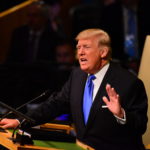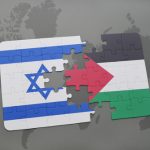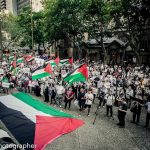Trump’s Israeli “Deal of the Century” Shafts Palestinians

Donald Trump released his administration’s Middle East “peace plan” – dubbed “the deal of the century” – on 28 January. And as Israeli PM Benjamin Netanyahu stood beside the US president, it was apparent that no Palestinian representation was there and nor would there be in the deal.
Just after its release, Jadaliyya co-editor Noura Erakat described it as an “Israeli plan”, which “consolidates all of its colonial takings for the past five decades, and it markets them” as a plan for peace.
“This is an imposition,” the Palestinian American human rights lawyer told CNN. “Under legal terms it would be called duress, which is a contractual agreement that does not allow the other party to have any other choice. It forces them to agree.”
The US policy was two years in the making. And it undermines the decades-old two-state solution, which involves Israel withdrawing from the Palestinian territory it took control of in 1967, which would leave Palestinians with 22 percent of their pre-1948 land.
However, the so-called deal of the century would only leave the Indigenous Palestinian people with a splintered 15 percent of the land they possessed prior to the creation of Israel, while East Jerusalem would be annexed, and Palestinian refugees would be left with no right to return.
Legitimising land grabs
“It’s not a deal. We don’t have any rights,” explained local Palestinian activist Khaled Ghannam. “They didn’t talk with the Palestinians. There isn’t any room for the peace process, only annexation. This takes around 60 percent of land from the West Bank.”
“We are supposed to forget about Jerusalem and forget about the refugees,” he continued. “And we need to forget about real independence, because we will be inside Israel. If you want to enter Palestine, you need to go to the Israeli border and then enter.”
Key proposals set out in the Trump administration’s plan include Israel taking Jerusalem and providing Palestinians with an alternative capital in the nearby village of Abu Dis, while more than 7 million displaced Palestinians would have no right to return to their ancestral lands.
The deal of the century also proposes the redrawing of borders. This would include legitimising illegal Israeli West Bank settlements and handing them over to Israel, while Palestine would be granted two areas in the Negev desert. And the land swaps would involve population transfers.
The Palestinian state formed would not only be under Israeli control, but it would be restricted from having its own military or forging strategic ties with other countries, leaving it completely at the mercy of Israeli forces.
“It’s not something we can accept,” Ghannam told Sydney Criminal Lawyers. “The main issue for us is Jerusalem. It’s the core of the problem.”
Suspect support and rejection
Ambassadors from the United Arab Emirates, Bahrain and Oman were present at the announcement of the deal, which was then reported as support for it. There’s also been coverage around Saudi Arabian and Egyptian support. However, Ghannam refutes this version of events.
“I spoke with some officials in the Emirates. And they said it’s American propaganda. They said they didn’t say yes or no,” the Socialist Alliance member explained. “They were present because there’s something in the protocol that when the Americans ask the ambassadors to go, they need to.”
And over the last weekend, the Arab League denounced the Trump deal, stating “it does not meet the minimum rights and aspirations of Palestinian people”. The Arab states outlined that it wouldn’t help the Trump administration implement it, and it warned against Israel establishing it by force.
The 22 Arab nations asserted that the two-state solution should be taken, and that the Palestinian territories Israel has occupied since the 1967 war – the West Bank, the Gaza Strip and East Jerusalem – should form an independent Palestinian state, with the eastern part of Jerusalem being the capital.
Palestinian Authority president Mahmoud Abbas held up maps at the meeting that showed the gradual erosion of Palestinian territory since pre-1948. And he said he challenged anyone gathered to actually find the Palestinian state on the map portraying the Trump proposal.
Vested fossil fuel interests
Trump’s deal of the century is not the first time the president has been releasing policies supporting the position of the apartheid Israeli state. In May 2018, he moved the US embassy to Jerusalem. And in September that year, he closed the Palestinian Liberation Organisation’s Washington DC mission.
Mr Ghannam points out that while the Trump administration does seem to have been rolling out the red carpet for the Israeli state, it has always been US policy to back the nation. And what he puts Trump’s current enthusiasm down to is his “need to steal” more Middle Eastern fossil fuels.
According to the activist, the “big deal” at the moment is the recent East Mediterranean gas deal, which involves Israel, Greece and Cyprus having agreed to build a pipeline linking offshore natural gas reserves to Europe, which could include gas fields in the territorial waters of Gaza.
In solidarity with Palestine
The local Palestinian community and the Palestine Action Group, along with various socialist parties, held a demonstration to stand in solidarity with Palestinian people globally against the Trump deal of the century at Sydney Town Hall on Friday afternoon.
Ghannam explained that the protest was especially in support of those Palestinians living in Israel, where they’re treated like second class citizens. Indeed, in 2018, the Netanyahu government enshrined this second class status in the nation’s de facto constitutional laws.
“There is about one million Palestinians that have Israeli citizenship, and they’re suffering,” Mr Ghannam concluded. “We want the peace process. And as the Australian government has said, it will not accept anything less.”







